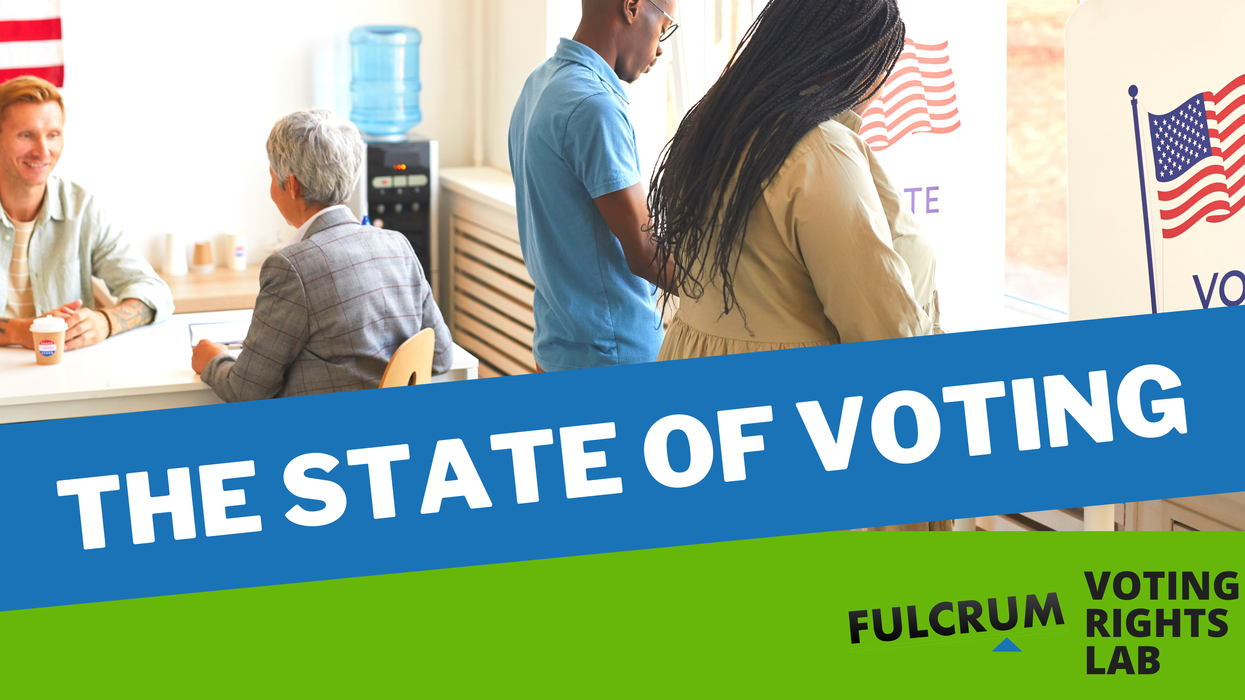This weekly update summarizing legislative activity affecting voting and elections is powered by the Voting Rights Lab. Sign up for VRL’s weekly newsletter here.
The Voting Rights Lab is tracking 2,158 bills so far this session, with 574 bills that tighten the rules governing voter access or election administration and 1,029 bills that expand the rules.
A New Hampshire bill that would create a stricter voter ID law and establish a new system of provisional ballots took another step forward last week, and Rhode Island enacted the Let RI Vote Act, which allows all voters to cast a mail ballot with no special reason or “excuse” required. Delaware’s House passed a bill to approve same day registration.
Arizona enacted a trio of bills that increase ballot and registration access. Louisiana enacted legislation expanding voter access during states of emergency and lawmakers sent bills to the governor that would increase election worker compensation as well as effectively ban secure ballot drop boxes.
Looking ahead: We’ll be watching to see if Gov. Kathy Hochul signs the New York Voting Rights Act, as well as legislation to meet the 10-day constitutional minimum for the state's voter registration deadline.
Here are the details:
Rhode Island creates no-excuse mail voting. On Tuesday, Gov. Daniel McKee signed the Let RI Vote Act ( S.B. 2007), which eliminates the requirement that voters have a special reason – or “excuse” – to vote by mail. Rhode Island is now one of 34 states that allow qualified voters to cast a ballot by mail with no excuse required. This new law also facilitates mail voting by allowing voters to request mail ballots online, requiring at least one drop box per municipality, and eliminating the requirement that voters get their mail ballots and mail ballot applications notarized or witnessed.
Arizona enacts legislation ensuring voters who apply for mail ballots, but do not return them, can still vote in person. Last week, Gov. Doug Ducey signed S.B. 1460, which allows voters who apply for mail ballots, but do not return them, to cast a regular ballot on Election Day (as long as the electronic poll book confirms that they have not returned their ballot). He also signed S.B. 1362, which allows voters with completed mail ballots to bring them to a polling place on Election Day, show ID, and insert the mail ballot directly into a tabulator without requiring the signature verification that all other mail ballots must undergo. Finally, Ducey signed S.B. 1170, which requires the Department of Game and Fish to provide voter registration services to people applying for a hunting, fishing or trapping license.
Louisiana expands voter access during states of emergency, and state lawmakers send bills to the governor that would ban drop boxes and increase election worker compensation. Last week, Gov. John Bel Edwards signed S.B. 258, which increases voter access during states of emergency by permitting the secretary of state to conduct early voting at times and locations accessible to affected voters. Also last week, the Legislature sent two other bills to the governor, including a bill that would effectively ban secure ballot drop boxes and one that would increase election worker compensation.
New Hampshire’s strict voter ID bill is signed by the speaker of the House and heads to the secretary of state. S.B. 418, which would make the state's voter ID law more restrictive, continues to advance through the legislative process. Now that the bill has been signed by the speaker of the House, it advances to the secretary of state’s office for signature and then to the governor. Current New Hampshire law allows voters without physical ID to cast a regular ballot if they complete an affidavit affirming their identity, under penalty of perjury. This bill would eliminate that alternative, and instead rescind their vote from the count if they are unable to show an ID within 10 days of the election. Most states with voter ID laws offer an alternative to ensure the identity of voters without ID can be verified through other means. This new bill would put New Hampshire in the minority.
The Delaware House passes same-day voter registration. The Delaware House of Representatives passed a bill that will allow voter registration to continue until the close of polls on Election Day. Under current law, the registration deadline is the fourth Saturday before Election Day. The bill now heads to the state Senate.




















Trump & Hegseth gave Mark Kelly a huge 2028 gift